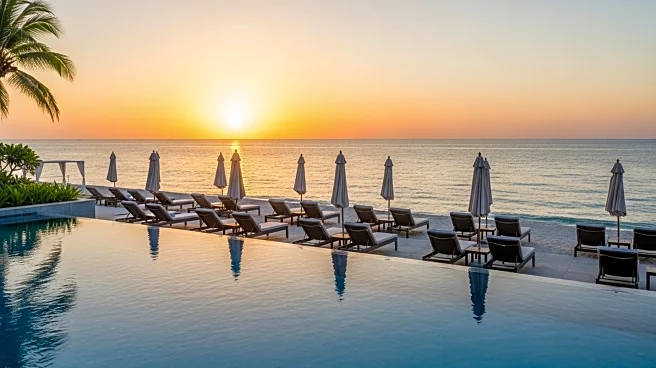What's Happening?
JW Marriott has announced the opening of its new resort, the JW Marriott Cam Ranh Bay Resort & Spa, marking a significant expansion of the luxury brand in Vietnam. This new establishment is located on Vietnam's central coast, blending beachside elegance with local cultural elements. The resort features 203 guest rooms and private villas, designed with organic tones and natural materials to reflect the coastal beauty of Cam Ranh. The resort also offers a variety of dining options inspired by the elements of nature, including a seafood grill and a pottery-themed restaurant. Additionally, the resort provides guests with a range of activities, from pottery classes to wellness treatments, aiming to create meaningful experiences rooted in well-being.
Why It's Important?
The opening of the JW Marriott Cam Ranh Bay Resort & Spa is a strategic move for Marriott International, as it strengthens the brand's presence in the rapidly growing Vietnamese tourism market. This expansion is likely to attract both international and domestic tourists, boosting local employment and contributing to the region's economic development. The resort's focus on cultural and natural elements also highlights a growing trend in the hospitality industry towards sustainable and culturally immersive travel experiences. This could set a precedent for future developments in the region, encouraging other luxury brands to incorporate local culture and sustainability into their offerings.
What's Next?
As the resort begins operations, it is expected to attract a significant number of tourists, potentially increasing competition among luxury hotels in the region. Marriott International may continue to expand its footprint in Vietnam and other Southeast Asian countries, capitalizing on the growing demand for luxury travel experiences. The success of this resort could lead to further investments in similar culturally and environmentally focused projects, influencing the broader hospitality industry to adopt more sustainable practices.
Beyond the Headlines
The resort's emphasis on local culture and sustainability reflects a broader shift in consumer preferences towards more authentic and responsible travel experiences. This trend could have long-term implications for the hospitality industry, as travelers increasingly seek out destinations that offer a deeper connection to local communities and environments. Additionally, the resort's integration of local craftsmanship, such as pottery, not only preserves cultural heritage but also provides economic opportunities for local artisans, highlighting the potential for tourism to support cultural preservation and economic development.









